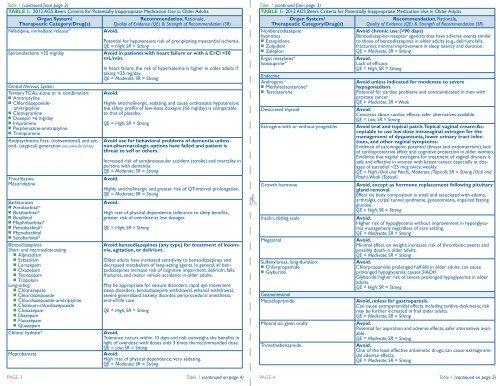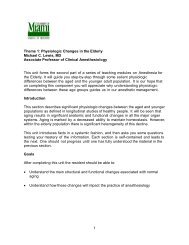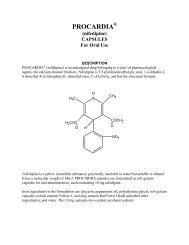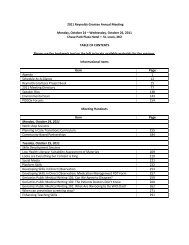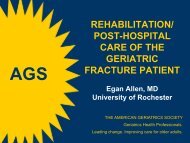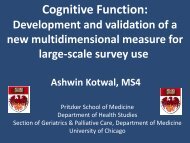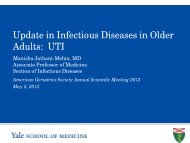Beers Criteria Printable Pocketcard - American Geriatrics Society
Beers Criteria Printable Pocketcard - American Geriatrics Society
Beers Criteria Printable Pocketcard - American Geriatrics Society
Create successful ePaper yourself
Turn your PDF publications into a flip-book with our unique Google optimized e-Paper software.
Table 1 (continued from page 2) Table 1 (continued from page 3)<br />
TABLE 1: 2012 AGS <strong>Beers</strong> <strong>Criteria</strong> for Potentially Inappropriate Medication Use in Older Adults<br />
TABLE 1: 2012 AGS <strong>Beers</strong> <strong>Criteria</strong> for Potentially Inappropriate Medication Use in Older Adults<br />
Organ System/<br />
Recommendation, Rationale,<br />
Therapeutic Category/Drug(s) Quality of Evidence (QE) & Strength of Recommendation (SR)<br />
Nifedipine, immediate release* Avoid.<br />
Potential for hypotension; risk of precipitating myocardial ischemia.<br />
QE = High; SR = Strong<br />
Spironolactone >25 mg/day Avoid in patients with heart failure or with a CrCl 6 mg/day<br />
n Imipramine<br />
n Perphenazine-amitriptyline<br />
n Trimipramine<br />
Antipsychotics, first- (conventional) and second-<br />
(atypical) generation (see online for full list)<br />
Thioridazine<br />
Mesoridazine<br />
Barbiturates<br />
n Amobarbital*<br />
n Butabarbital*<br />
n Butalbital<br />
n Mephobarbital*<br />
n Pentobarbital*<br />
n Phenobarbital<br />
n Secobarbital*<br />
Benzodiazepines<br />
Short- and intermediate-acting:<br />
n Alprazolam<br />
n Estazolam<br />
n Lorazepam<br />
n Oxazepam<br />
n Temazepam<br />
n Triazolam<br />
Long-acting:<br />
n Chlorazepate<br />
n Chlordiazepoxide<br />
n Chlordiazepoxide-amitriptyline<br />
n Clidinium-chlordiazepoxide<br />
n Clonazepam<br />
n Diazepam<br />
n Flurazepam<br />
n Quazepam<br />
In heart failure, the risk of hyperkalemia is higher in older adults if<br />
taking >25 mg/day.<br />
QE = Moderate; SR = Strong<br />
Avoid.<br />
Highly anticholinergic, sedating, and cause orthostatic hypotension;<br />
the safety profile of low-dose doxepin (≤6 mg/day) is comparable<br />
to that of placebo.<br />
QE = High; SR = Strong<br />
Avoid use for behavioral problems of dementia unless<br />
non-pharmacologic options have failed and patient is<br />
threat to self or others.<br />
Increased risk of cerebrovascular accident (stroke) and mortality in<br />
persons with dementia.<br />
QE = Moderate; SR = Strong<br />
Avoid.<br />
Highly anticholinergic and greater risk of QT-interval prolongation.<br />
QE = Moderate; SR = Strong<br />
Avoid.<br />
High rate of physical dependence; tolerance to sleep benefits;<br />
greater risk of overdose at low dosages.<br />
QE = High; SR = Strong<br />
Avoid benzodiazepines (any type) for treatment of insomnia,<br />
agitation, or delirium.<br />
Older adults have increased sensitivity to benzodiazepines and<br />
decreased metabolism of long-acting agents. In general, all benzodiazepines<br />
increase risk of cognitive impairment, delirium, falls,<br />
fractures, and motor vehicle accidents in older adults.<br />
May be appropriate for seizure disorders, rapid eye movement<br />
sleep disorders, benzodiazepine withdrawal, ethanol withdrawal,<br />
severe generalized anxiety disorder, periprocedural anesthesia,<br />
end-of-life care.<br />
QE = High; SR = Strong<br />
Chloral hydrate* Avoid.<br />
Tolerance occurs within 10 days and risk outweighs the benefits in<br />
light of overdose with doses only 3 times the recommended dose.<br />
QE = Low; SR = Strong<br />
Meprobamate Avoid.<br />
High rate of physical dependence; very sedating.<br />
QE = Moderate; SR = Strong<br />
Organ System/<br />
Therapeutic Category/Drug(s)<br />
Nonbenzodiazepine<br />
hypnotics<br />
n Eszopiclone<br />
n Zolpidem<br />
n Zaleplon<br />
Ergot mesylates*<br />
Isoxsuprine*<br />
Endocrine<br />
Androgens<br />
n Methyltestosterone*<br />
n Testosterone<br />
Recommendation, Rationale,<br />
Quality of Evidence (QE) & Strength of Recommendation (SR)<br />
Avoid chronic use (>90 days)<br />
Benzodiazepine-receptor agonists that have adverse events similar<br />
to those of benzodiazepines in older adults (e.g., delirium, falls,<br />
fractures); minimal improvement in sleep latency and duration.<br />
QE = Moderate; SR = Strong<br />
Avoid.<br />
Lack of efficacy.<br />
QE = High; SR = Strong<br />
Avoid unless indicated for moderate to severe<br />
hypogonadism.<br />
Potential for cardiac problems and contraindicated in men with<br />
prostate cancer.<br />
QE = Moderate; SR = Weak<br />
Desiccated thyroid Avoid.<br />
Concerns about cardiac effects; safer alternatives available.<br />
QE = Low; SR = Strong<br />
Estrogens with or without progestins Avoid oral and topical patch. Topical vaginal cream: Acceptable<br />
to use low-dose intravaginal estrogen for the<br />
management of dyspareunia, lower urinary tract infections,<br />
and other vaginal symptoms.<br />
Evidence of carcinogenic potential (breast and endometrium); lack<br />
of cardioprotective effect and cognitive protection in older women.<br />
Evidence that vaginal estrogens for treatment of vaginal dryness is<br />
safe and effective in women with breast cancer, especially at dosages<br />
of estradiol


